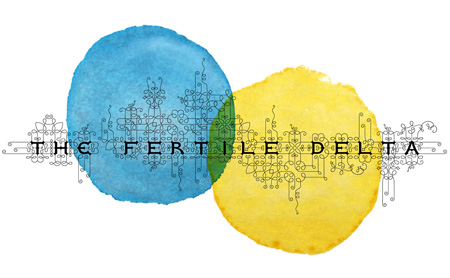PUSH 2008: The Fertile Delta
Art: Stuart Flake
Design: Spyglass Creative
Dear Friends,
I was once told that conferences generally fall into one of three classes: Show and Tell, Industry Specific, and Brain Food. The Show and Tell type is where new products are demonstrated in Expo style. The Industry Specific, by far the most common type, features case studies, best practices and tools of the trade to keep practitioners up to date on what’s happening in their field. The third type, Brain Food, assembles diverse disciplines, people and ideas for a clearer view of what’s “pushing the future in new directions.” PUSH is a Brain Food conference. It’s big (ideas), it’s broad (perspective), it’s brave (leadership). As such, it doesn’t break down to familiar sound-bites very well and can be a real bear to explain. I’ve found this year’s theme, The Fertile Delta, especially challenging to talk about. In essence, it’s a land-of-opportunity concept that’s based on a sequence of observations and assumptions about the world. They are:
- While globalization is bringing more players to the table, many more are being left behind
- This widening gap in resources, wealth, education, technology, and health care is a destabilizing influence
- Polarization is also expressed in disparity in population density, rise in religious fundamentalism, and clashes of cultures and political ideologies
- Phrases such as “The Great Divide,” “Clash of Civilizations,” “Digital Divide,” and “Two Americas” refer to a growing chasm within and among societies
- Add scarcity to the mix – such as we have now in fuel, food, water, clean environments, jobs, financial security – and decisions are increasingly made out of fear, and for short-term gains
- This trend is unsustainable; we need to re-think business models and social systems for agility and truly sustainable solutions
- Yet, while this “space between” faces extreme, potentially game-changing challenges, it also represents enormous, untapped opportunity
So, welcome to PUSH 2008, where we’ll see why polarization never looked so good. Why – as happens at the beginning of all new life – it’s a necessary process for a world in transition. Why the gap between an old world and one just emerging is a fertile delta for innovative business models and partnerships that serve a growing slice of our local and global communities.
Far from offering a simplistic, Pollyanna white-wash of a society under stress, our message is that those who want to lead the future will have to lead from this “space between” – not as a moral imperative or idealized need to do good, but as a matter of survival.
It’s also a matter of creativity. Of courage. Of sober, real-world analysis. In other words, the stuff of leadership.
The PUSH 2008 presenters are stellar examples of these qualities. They’re here to guide us into the Fertile Delta, and through the four areas where polarization runs deepest: Economics, Politics, Religion, Technology. As we go, they’ll point out how and where things are changing in each of these domains, and share their pioneering work within and for The Fertile Delta.
The line-up reads like an embarrassment of riches in smarts, heart and talent. I find it way too easy to fall into hyperbolic fawning with this group and will let them, instead, speak for themselves. Because, sometimes, things can’t be explained, they just have to be experienced.
Enjoy!
Cecily Sommers
President, Push Institute
The rise of new competitors and markets is an oft-discussed result of an increasingly interdependent global economy. But what we take for a smaller, flatter world also means that seemingly unrelated issues such as war, global warming and aging populations will converge on the future to close existing divides and open others. Whether slow–growing cracks or earth–shattering rumbles, economic fissures must be watched and measured, with one eye on the near and now, the other on the far and future.
Because religion integrates personal, public and political identities so seamlessly, it is a powerful influence on how societies create, reject or adapt to change. Where civic structures are immature or insufficient, religious groups often fill in the gaps with resources that would otherwise be impossible to access. As the quest for and experience of truth unifies believers and non–believers alike, it also separates them in conflicting agendas of “right, might and fight.” How are we to accommodate such irreconcilable differences in our view of the future? And how deeply are religious movements driving politics, immigration and urbanization – and a new middle class – in the 21st century?.
The sad irony of political leadership throughout the world is that it’s trapped in reactive battles for power and popularity. As the recent mortgage crisis demonstrates so clearly, “leaders” too often borrow against tomorrow for short–term wins and long–term consequences. Is short–sightedness simply baked into the design of the political process? Is “political leadership,” in fact, an oxymoron? Would think tanks, beholden to no one but their funders, take on even more of the long–range planning and policy construction? Is the mantle of community leadership – from neighborhoods to nations – fixed, or is it likely to be shared, shifted or stolen?
Technology is the most observable edge of change, offering new capabilities to extend or replace how we mediate our world, our systems, our advantage. New technologies are little prisms of wonder that tease our imagination into brave new worlds of possibility. Consider how much of our economy has been stimulated in response to game–changing technologies such as automobiles, television, aircraft, the Web and cell phones. Much more awaits us still, calling us to invent new futures with new tools, players and solutions for what inspires us.





